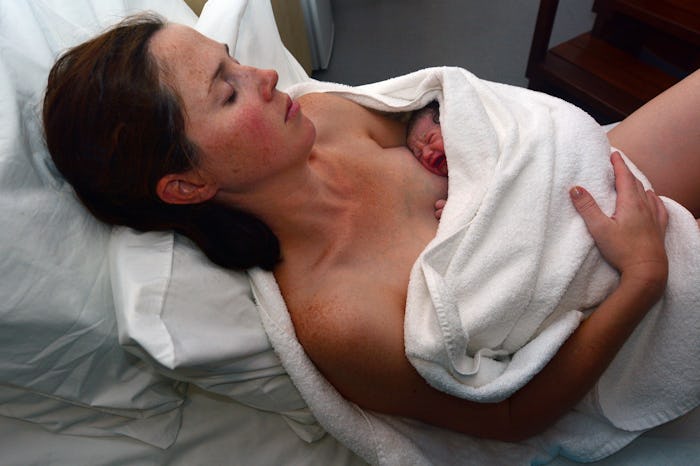Whether you want a "natural" birth because you want to avoid medical interventions or because it seems like the best choice for you, one thing is sure: planning your labor and delivery is a big deal. For moms who want a natural birth, they may have a list of concerns and worries to address with their doctors, especially if they're nervous about how medical interventions or a C-section could possibly affect their baby. But how does a "natural" birth affect baby later in life? Does it really make a difference?
Lamaze Certified Childbirth Educator (LCCE) and Fellow of American College of Childbirth Educators (FACCE) Deena Blumenfeld of Shining Light Prenatal Education tells Romper that in order to speak about how a "natural" birth affects a child later in life, you have to define what that term means. When it comes to "natural birth" Blumenfeld says:
I prefer the term "normal physiologic birth," which means that a mother started labor on her own, she received no medications or medical interventions during labor and delivery, and she did not receive any in the immediate postpartum, such as prophylactic Pitocin.
But that "normal physiologic birth" doesn't seem to affect a baby's future as much as simply being born vaginally.
"There is some evidence to show that babies born via C-section have higher rates of allergies, digestive issues, and asthma," she says. "The newest data we have is on the infant gut microbiome: the 'good' bacteria in our guts. The data shows that babies born vaginally, not necessarily a normal physiologic birth, have a very different gut flora than a baby born via C-section does."
Blumenfeld notes that the assumption, since there isn't enough data to fully support the claim, is that the different gut flora affects babies born via C-section adversely and causes the issues like allergies, asthma, and digestive issues. But she says this can be mitigated through skin-to-skin contact with mom, dad, and other caregivers after birth, and by breastfeeding.
"In the immediate time after birth, C-section babies often need more medical intervention than vaginally born babies," Blumenfeld says. "They need to be suctioned at birth because the amniotic fluid is not being properly squeezed out during their passage through the birth canal and a C-section may also cause a delay in initiation of breastfeeding due to separation of mother and baby."
So will a natural childbirth give your baby the best possibility of a healthy future? Maybe. But there's not enough evidence to fully support that, nor does it guarantee that your baby won't have health issues later in life. "Other lifestyle and parenting choices affect a baby more than their method of birth does in this case," Blumenfeld says. So if you want a natural childbirth, go for it, but don't expect it to give your baby the ultimate immune system as they grow. Make sure to talk to your healthcare provider about your wishes and birth plan so they can help you make the right decision for you and your baby.
